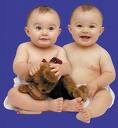Kerala Village With 250 Sets Of Twins Baffled Doctors!
 Amazed doctors are making attempts to ravel out the secret of an Indian village having over 220 sets of twins, which were born to just 2,000 families tropical village of Kodinhi, in Kerala.
Amazed doctors are making attempts to ravel out the secret of an Indian village having over 220 sets of twins, which were born to just 2,000 families tropical village of Kodinhi, in Kerala.
Specialists who visited the village have been left rubbing their hands over the fact that has seen about six times more twins born than the worldwide average.
Out of 300 healthy deliveries, around 15 pairs of twins took birth in the village during the last year (2008), and there are expectations that this year’s figure will overcome the previous figures.
According to reports, up to 60 pairs of twins have been born during the last five years alone, and the rate of twins is going up year-on-year.
Dr. Krishnan Sribiju, local doctor and twin enthusiast, has been examining the medical wonder of Kodinhi for the last two years and is fascinated.
"The number of twins per thousand here is around 45 per 1,000 births," he said.
"Indian, and by that I mean Asian, people on the sub-continent have the lowest acknowledged incidences of twinning in the world at around four per 1,000.
"In addition, there is no IVF treatment here owing to the excessive cost. Global rates of twins being born, especially in the western world, have gone up because of artificial insemination.
"Also, twins are born usually to older, more mature women. In Kodinhi that is not the case because marriage happens much younger here at around 18-20 years-old and families begin very soon after.
"Another factor that bucks the trend is that twins occur in women who are generally over 5ft 3in in height. The height of women in Kodinhi is around 5ft on average."
Even though alike twins are believed to be a coincidence, the village has its share of those too.
Debbie Ross, from Tamba, a charity, which specializes in twins and multiple births, told online that the unusual births could be because of several factors.
"Usually, there's about a one in 65 chance of having non-identical twins, with the chances lessening the older the mother gets," she explained.
In the case of this particular village, Ms Ross proposes that there could be an inherited factor at work.
"It may be that many of the families with twins are related in some way - and there is a hereditary factor to twin births - you're more likely to have twins if there is a previous maternal history of it."